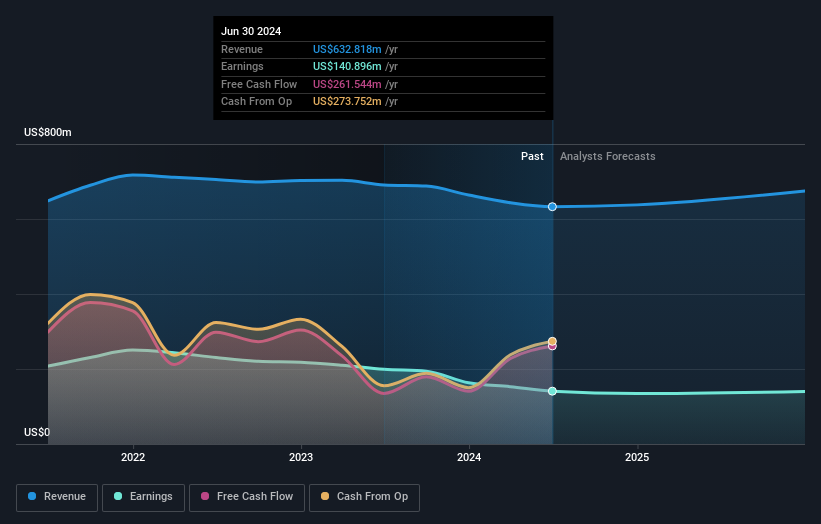- United States
- /
- Banks
- /
- NYSE:BOH
Bank of Hawaii (NYSE:BOH) shareholders have earned a 34% return over the last year

Diversification is a key tool for dealing with stock price volatility. But if you're going to beat the market overall, you need to have individual stocks that outperform. Bank of Hawaii Corporation (NYSE:BOH) has done well over the last year, with the stock price up 28% beating the market return of 25% (not including dividends). In contrast, the longer term returns are negative, since the share price is 17% lower than it was three years ago.
So let's investigate and see if the longer term performance of the company has been in line with the underlying business' progress.
See our latest analysis for Bank of Hawaii
To paraphrase Benjamin Graham: Over the short term the market is a voting machine, but over the long term it's a weighing machine. One imperfect but simple way to consider how the market perception of a company has shifted is to compare the change in the earnings per share (EPS) with the share price movement.
Over the last twelve months, Bank of Hawaii actually shrank its EPS by 29%.
Given the share price gain, we doubt the market is measuring progress with EPS. Indeed, when EPS is declining but the share price is up, it often means the market is considering other factors.
We haven't seen Bank of Hawaii increase dividend payments yet, so the yield probably hasn't helped drive the share higher. It saw it's revenue decline by 8.4% over twelve months. It's fair to say we're a little surprised to see the share price up, and that makes us cautious.
The company's revenue and earnings (over time) are depicted in the image below (click to see the exact numbers).

Take a more thorough look at Bank of Hawaii's financial health with this free report on its balance sheet.
What About Dividends?
When looking at investment returns, it is important to consider the difference between total shareholder return (TSR) and share price return. The TSR incorporates the value of any spin-offs or discounted capital raisings, along with any dividends, based on the assumption that the dividends are reinvested. Arguably, the TSR gives a more comprehensive picture of the return generated by a stock. As it happens, Bank of Hawaii's TSR for the last 1 year was 34%, which exceeds the share price return mentioned earlier. This is largely a result of its dividend payments!
A Different Perspective
It's good to see that Bank of Hawaii has rewarded shareholders with a total shareholder return of 34% in the last twelve months. That's including the dividend. That certainly beats the loss of about 1.3% per year over the last half decade. The long term loss makes us cautious, but the short term TSR gain certainly hints at a brighter future. Before spending more time on Bank of Hawaii it might be wise to click here to see if insiders have been buying or selling shares.
We will like Bank of Hawaii better if we see some big insider buys. While we wait, check out this free list of undervalued stocks (mostly small caps) with considerable, recent, insider buying.
Please note, the market returns quoted in this article reflect the market weighted average returns of stocks that currently trade on American exchanges.
Valuation is complex, but we're here to simplify it.
Discover if Bank of Hawaii might be undervalued or overvalued with our detailed analysis, featuring fair value estimates, potential risks, dividends, insider trades, and its financial condition.
Access Free AnalysisHave feedback on this article? Concerned about the content? Get in touch with us directly. Alternatively, email editorial-team (at) simplywallst.com.
This article by Simply Wall St is general in nature. We provide commentary based on historical data and analyst forecasts only using an unbiased methodology and our articles are not intended to be financial advice. It does not constitute a recommendation to buy or sell any stock, and does not take account of your objectives, or your financial situation. We aim to bring you long-term focused analysis driven by fundamental data. Note that our analysis may not factor in the latest price-sensitive company announcements or qualitative material. Simply Wall St has no position in any stocks mentioned.
About NYSE:BOH
Bank of Hawaii
Operates as the bank holding company for Bank of Hawaii that provides various financial products and services in Hawaii, Guam, and other Pacific Islands.
Flawless balance sheet established dividend payer.


